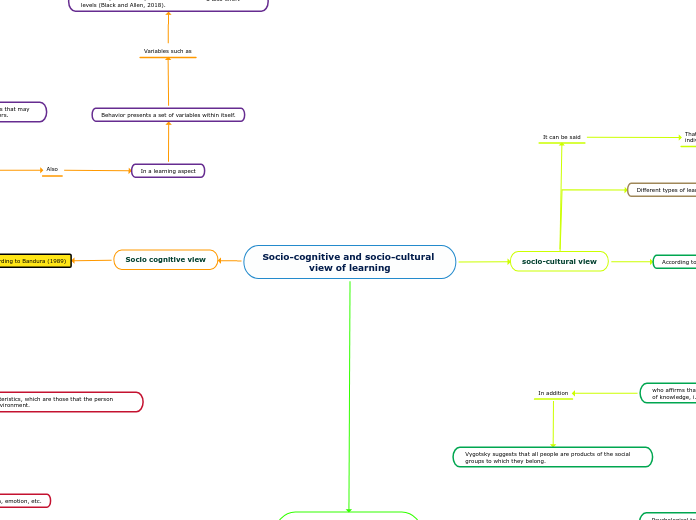Socio-cognitive and socio-cultural view of learning
Socio cognitive view
According to Bandura (1989)
One learns in an academic environment
Observing and interacting with other people
Therefore
Learning includes both the behavior and the environment where such behavior takes place
Then
Environment is a composite of
- Physical setting (classroom, home)
- Objects of the environment that the person observes and with which he/she interacts cognitively. (People and comments)
Which in turn includes
Personal characteristics, which are those that the person brings to the environment.
Previous knowledge in such interaction
In terms of
Cognitive skills, motivation, emotion, etc.
Then
Behavior is
The constant interaction of the environment and responses to it. Responses that are reciprocally given
Which in turn
Influences both the environment and the responses that may occur in the environment, i.e., the behavior of others.
Also
In a learning aspect
Behavior presents a set of variables within itself.
Variables such as
Academic performance, social interactions and also effort levels (Black and Allen, 2018).
socio-cultural view
According to Wertsch and Tulviste (1992)
Learning from the sociocultural viewpoint arises from the control and internalization of the social interactions that occur in a given environment.
This arises from
Vygotsky (1896 - 1934)
who affirms that learning is based on the constant exchange of knowledge, i.e., interactions between subjects.
In addition
Vygotsky suggests that all people are products of the social groups to which they belong.
That is given by means of
Psychological tools created during interactions through verbal and written language.
Different types of learning are imparted
Depending of
How homogeneous or heterogeneous is the group to which learning is imparted.
In a homogeneous group
There are fewer differences in the thoughts that can be shared in the group.
In a Heterogeneous group
There is more diversity in what is shared within these groups.
It can be said
That thinking and interactions contribute to the learning and individual development of people.
Sebastian Rodriguez Castro
Educational Psychology
Faculty of Psychology
University of La Sabana
References
Bandura, A. (1989). Human agency in social cognitive theory. American psychologist, 44(9), 1175.
Black, S., & Allen, J. D. (2018). Part 5: learning is a social act. The Reference Librarian, 59(2), 76-91.
